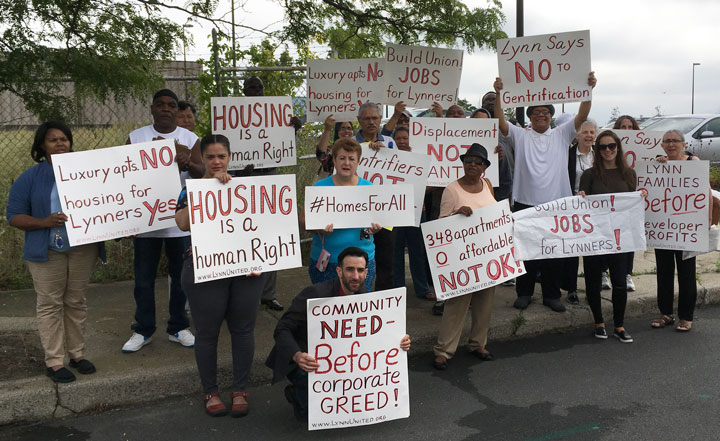We are concerned that many voices are being left out of the discussion about Lynn’s future. We believe new development can be good for Lynn, but only if it takes into account the needs of our city's working class and lower-income residents.
-
There is a housing affordability crisis across the country.1 In Lynn, this crisis is impacting a wide range of working class households. Rents are too high. Both homeowners and tenants are having trouble keeping up with housing costs.2 Some longtime residents are being pushed out.
Therefore, new developments must include a significant percentage of units affordable to current Lynn residents with moderate, low, and very low incomes.
-
Lynn residents are also struggling with a lack of living wage jobs. Unions help ensure a living wage and fair treatment for workers.
Therefore, new developments must be built with union labor, and Lynn residents must have access to these jobs.

If projects meet these standards and are environmentally friendly, we will welcome them.
On the other hand, we have seen development cause gentrification, segregation, evictions, and displacement in East Boston, Somerville, and many other areas. We will fight to stop that kind of development.
We are not alone in our concern with these issues. In a 2015 survey focused on contested City Council races, over half of the current members of the City Council agreed that the Council "should work to increase the amount of affordable rental housing in Lynn."
A majority of the City Council also stated support for efforts to ensure "a portion of new housing units built on the waterfront are accessible and affordable to working class and lower income Lynn residents."
We are not opposed to development, but we don’t want to see the creation of segregated enclaves where only wealthy people live.
We want Lynn to change and grow, but we don’t want its character and identity as a working class city to be lost.
Improvements to Lynn won’t do us any good if we just end up getting pushed out of our own city. We don’t want rising rents and homeownership costs to displace our family members, our neighbors, and our small businesses.
We hope you are ready to work with us and with other community groups to create a new model for equitable development that truly benefits the people of Lynn.
— Lynn United for Change
Footnotes
- See, for example, "The State of the Nation's Housing 2016" by the Joint Center for Housing Studies of Harvard University (http://jchs.harvard.edu/research/state_nations_housing).
- Lynn's official current "Consolidated Plan" indicates that 52% of all Lynn households are cost burdened. Rent costs seem to have increased significantly since that data was collected.
The content on this page is adapted from a flyer distributed by Lynn United for Change at a "Developer Tour" in Lynn, MA hosted by local, state, and federal elected officials on September 20, 2016.
